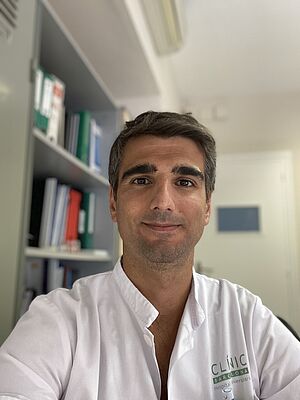Miquel Blasco

Josep Miquel Blasco Pelicano is a Nephrologist in the Nephrology and Renal Transplant Department at Hospital Clínic, University of Barcelona. Within this department, he is part of the "Xarxes i Unitats d’Expertesa Clínica" (XUEC) network, the “Centros, Servicios, y Unidades de Referencia” (CSUR) for complex glomerular disease, as well as the "European Reference Network in Minoritary Kidney Disease" (ERK-Net). He leads the study of complement mediated diseases, thrombotic microangiopathies and hereditary kidney disease within these units.
Dr. Blasco graduated in Medicine in 2004 and specialized in Nephrology between 2005 and 2009 at hospital Clínic de Barcelona. He is a certified researcher (R3A) at the Health Research Institute Fundació de Recerca Clínic Barcelona - Institut d'Investigacions Biomèdiques August Pi i Sunyer (IIS-FRCB-IDIBAPS) and an active member of the Laboratory for Experimental Nephrology and Renal Transplantation (LENIT). He was a member of the Spanish Renal Research Network (REDinREN) from 2012 and is now part of the Cooperative Health Research Networks Oriented to Results (RICORS2040) since 2022, continuing the work of REDinREN.
Since 2010, Dr. Blasco has been actively involved in teaching, initially as a teaching collaborator in the Medicine degree program at the University of Barcelona (2011-2020), and since the 2020–2021 academic year, as an Associate Professor in Medicine. He has been a faculty member in various Master's programs, including "Autoimmune Diseases" and "Critical Care Medicine" (since 2014) and "Diabetes and Renal Diseases" (since 2022). Between 2017 and 2023, he coordinated the clinical sessions for residents in the Nephrology and Renal Transplant Department. He has supervised two final medicine degree projects and is currently supervising a PhD project at the University of Barcelona on the role of complement in ANCA-associated vasculitis.
Dr. Blasco has played a crucial role in national and international research projects. He co-led a Spanish multicenter study on complement involvement in pre-eclampsia and HELLP syndrome (granted by “La Marató de TV3”; code:163/U/2020), resulting in multiple high impact publications. As a co-investigator, he contributed to major projects on precision medicine in chronic kidney disease and the use of colchicine for vascular event prevention (granted by ISCIII; code:ICI22/00006). As Principal Investigator, he led studies on complement and endothelial damage in ANCA-vasculitis (granted by Spanish Society of Nephrology; code: PI046843) and biomarkers in ABO-incompatible kidney transplantation (ISCIII; code:PI22/00240). From September 2023 to August 2024, Dr. Blasco has been conducting research as an Associate Researcher at the Glomerular Kidney Disease Center, New York Presbyterian Hospital – Columbia University. This stay was funded by an ISCIII grant (code:BA23/00008)) and has resulted in an editorial publication and the submission of a highimpact research article.
Dr. Blasco has been deeply involved in clinical guideline development. He co-authored the Spanish Society of Nephrology's guidelines for atypical hemolytic uremic syndrome (aHUS) and participated in international guidelines on thrombotic microangiopathy (TMA) in pregnancy, published in Blood. He has been actively engaged in the KDIGO controversies on complement in kidney disease, attending key conferences in 2017 and 2022. His contributions to clinical trials helped approve Eculizumab and Ravulizumab for aHUS. He is a member of the Catalan, Spanish, and European Societies of Nephrology (SOCANE, SEN, and ERA) and participates in the working groups on glomerular diseases (GLOMCAT and GLOSEN), hereditary diseases, complement-mediated diseases, and therapeutic apheresis of the SEN. From 2020 to 2023, he was a board member of the Spanish Society of Nephrology and now is part of the GLOSEN board.
J. Miquel Blasco Pelicano, , has positioned the Nephrology and Kidney Transplantation Department at hospital Clínic Barcelona as a reference center. His research has led to the development of new diagnostic tools for complement-mediated diseases and novel research lines funded at the national level. By integrating molecular, histological, and genetic insights, his work advances precision medicine in nephrology and maternal-fetal medicine, strengthening the institution's leadership in glomerular and complement-mediated diseases. The current proposal is integrated within our experienced multidisciplinary group, following the research line of a competitive project from the Marató de TV3 on severe early preeclampsia (163/U/2020) and a recent ISCIII project on ABO-incompatible kidney transplantation (PI22/00240).

